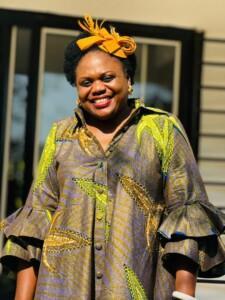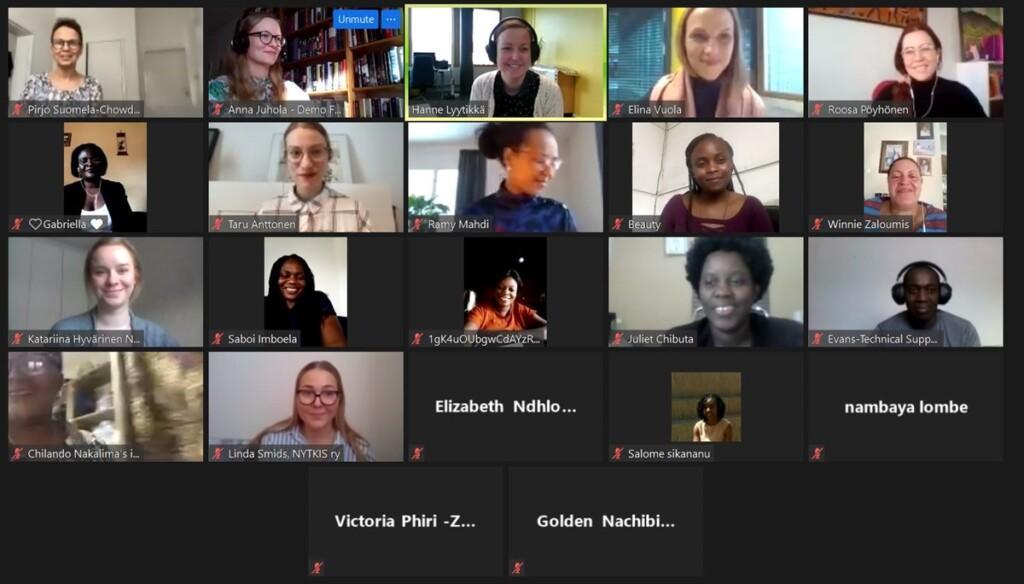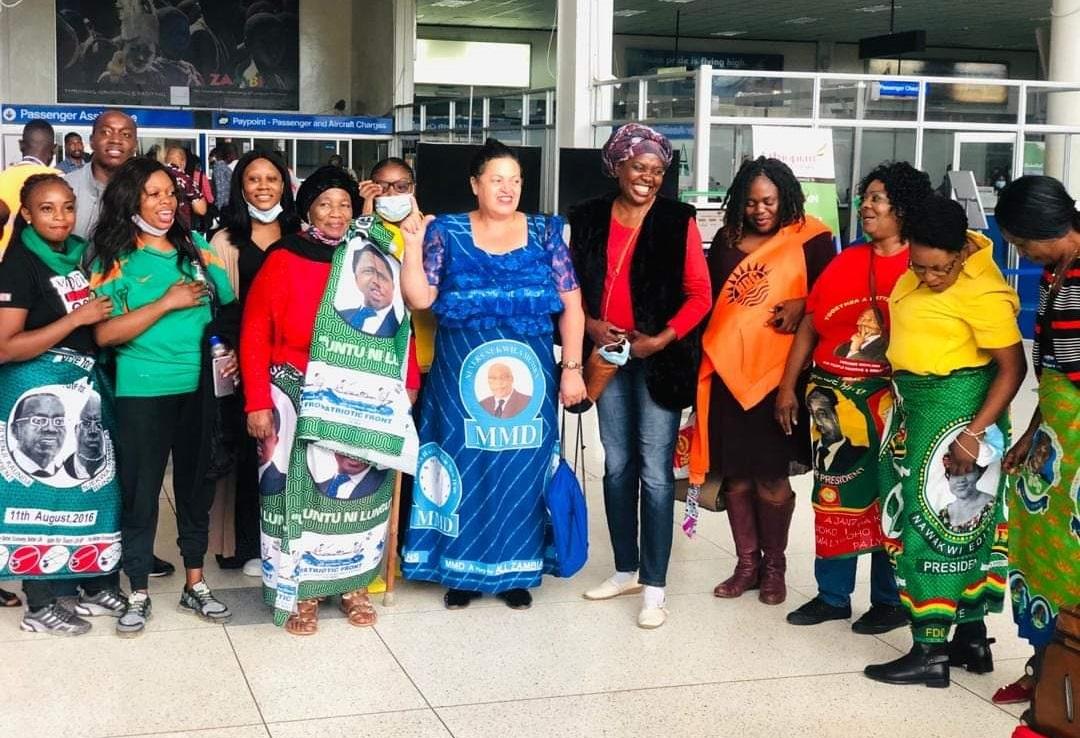“We may come from different parties, but we support each other as women. They support me and I support them”, says Saboi Imboela, President of the National Democratic Congress party, on the collaboration in the National Women in Politics Platform.
In partnership with the Zambia National Women’s Lobby (ZNWL), Demo Finland supported women’s political participation in Zambia from 2013 to 2022. The programme strengthened the competencies and leadership skills of local councillors, supported political parties in promoting gender equality and facilitated multi-party co-operation among women. Dialogue platforms for women politicians were established both at the local level in three districts (Kaoma, Kapiri Mposhi and Lusaka) and at the national level. Training sessions were also organised for women candidates, aspiring women candidates and campaign managers of women candidates.
Dialogue platform boosting political careers
Saboi Imboela, President of the National Democratic Congress, chaired the National Women in Politics Platform (NWIP) for three years from 2019 to 2022. When she started as chair of the NWIP, Imboela held positions of spokesperson of the party and chairperson in charge of gender and child development, but she gradually moved up in the party ranks to become the President of the party in 2021.
The platform allowed women to grow in their political parties and be viewed in a different light.

Imboela says her chairpersonship of the NWIP was crucial in her becoming the President of the party: “Us interacting and networking with fellow women and other organisations has boosted our confidence to the point where even the men in our respective parties look at us with respect.”
Several other women of the platform have also risen to more prominent positions in their parties, says Imboela. According to her, the platform allowed them to grow in their political parties and be viewed in a different light.
Women disadvantaged in Zambian politics
Although women have been able to take up more space in political parties, women’s political participation in Zambia remains low. “In the whole Southern African region, Zambia is one of the worst when it comes to women’s representation in politics”, Imboela says. Currently, women make up around 15% of the members of the Parliament.
According to Imboela, reasons for the underrepresentation of women include the toxic and hostile atmosphere in politics and high candidate fees. There is a lot of prejudice based on party affiliations, and political violence during elections has been fairly widespread. In addition, the high fees to stand for election, both for running as a candidate within the party and for standing as a candidate, make it difficult for women, among others, to participate in elections. Corruption is also a problem. “Within the political parties, men have the muscle, and some of them are also open to bribing the officials,” says Imboela.
At the NWIP, women stood together despite representing different political parties.
Because of the shared challenges, Imboela has greatly valued the mutual support of women across party lines. At the NWIP, women stood together despite representing different political parties, even across government-opposition lines. Imboela recalls a study visit to Rwanda by NWIP members, who dressed in their own party regalia on the way. At the airport, other passengers wondered how women from different parties could move around together. “We explained to them that we are all from different political parties, but we are women standing with each other.”

Support and co-operation across party lines is not a given, as Imboela does not recall any co-operation between political parties before Demo Finland and ZNWL’s programme. Indeed, co-operation between women from different parties was unheard of. Nevertheless, Imboela says the feedback from colleagues in her party has been overwhelmingly positive. “Some joked about whether women want to take over. But there has been a lot of support.”
Co-operation between women is regarded as natural because women are seen as mothers and peacemakers. Therefore, they are also respected and listened to, and Imboela sees potential for women to also set an example for inter-party co-operation more broadly in Zambia.
Getting political parties on board
Golden Nachibinga, ZNWL Head of Programmes, recalls that there were some challenges in the beginning: “The women were very clear that they needed this platform. However, there was scepticism among political party leaders, as it was not clear to them what the women from the various political parties would be doing.”

According to Nachibinga, the key to success was that, before setting up the women’s platform, a training was organised for the national executives of parties on what the objectives were and how the platform would work. As the understanding of the initiative increased, the background support of the parties was secured. In fact, the activities of the NWIP proved so attractive that even political parties not initially involved in the platform showed interest in participating.
The platform provided women with peer support and space for sharing experiences, learning from each other and promoting common issues. However, the platform was also engaged with the political party leadership, which enabled the women to promote gender equality within the parties. Members of the NWIP received support from the ZNWL to draft gender equality plans within the parties, and reflecting on their own context, the parties came up with measures to improve gender equality.
“The programme gave us that capacity and templates to do that”, says Imboela. “The way things often happen in political parties is that things are not written down, people just do things. With the gender equality plans, there was now a systematic way of doing things, putting it on paper and doing follow-up.”
Members of the NWIP received support from the ZNWL to draft gender equality plans within the parties.
Nachibinga says that not all parties have formally adopted gender equality plans, as this would require decisions from the national conventions, which have not been held so far. What is significant, however, is that even without formal adoption, many parties are implementing the measures set out in the plans.
Imboela’s party NDC not only has a gender equality plan in place, but it has also inspired the party to develop a similar action plan for young people. “We call it the youth action plan. The skill the programme gave us went beyond the women.”
Mutual learning and concrete action
Women’s co-operation in the platforms has also produced concrete outcomes. The NWIP has produced various statements in which the platform has jointly raised issues that the women consider important. Platforms have also organised events such as International Women’s Day and visited and made donations to hospitals’ maternity wards. At the local level, women have also supported a common candidate in by-elections. In addition, members of the NWIP have met women in different parts of Zambia, mentoring them and encouraging them to work hard and create more space for women in politics.
The study visit to Rwanda in late 2020 was an eye-opening experience for Saboi Imboela: “It was very useful and life-changing”, she says. Rwanda has the highest proportion of women in parliament in the world, and the study visit participants wanted to find out what Rwanda has done right and what Zambia could learn. They were able to talk to women MPs from both the government and the opposition, and found politics to be less divided and less black and white than in Zambia.
Members of the NWIP have met women in different parts of Zambia, mentoring them and encouraging them to work hard and create more space for women in politics.
Another important finding, according to Imboela, was that money does not play such an important role in Rwandan politics as it does in Zambia, as candidate fees are not a barrier to running for office. Rwanda has a proportional representation system and a gender quota in parliamentary elections, while in Zambia, representatives are elected from single-seat constituencies by simple majority vote, with no quotas. In addition, Imboela says that corruption in elections is tackled more rigorously in Rwanda than in Zambia, and there is less political violence.
Imboela was also impressed by the cleanliness of Rwanda’s capital, Kigali. “When we arrived at night, the first thing we realised was how clean the city was. Back home, we were joking that Rwanda is clean because there are many women in decision-making.”

Demo Finland and ZNWL’s programme on women’s political participation ended three years ago, and the National Women in Politics platform is less active now. However, the platform still exists, and communication takes place primarily through a WhatsApp group. Golden Nachibinga sees that the programme’s impact is still ongoing: “The biggest thing is the change of attitude by the women themselves, but also by the political parties. The support for strengthening women’s political participation is there.”
Less violence through multi-party co-operation
In Zambia, multi-party co-operation is new and fragile. Saboi Imboela and Golden Nachibinga describe the impact of co-operation through several perspectives: “Co-operation takes away the political violence. To many people, when you are at another party, you can’t see each other eye to eye. That is why it is important to show that parties work together”, says Imboela. In addition, she sees multi-party co-operation as a way of promoting women’s participation, especially if women work together to support each other.
Nachibinga adds that multi-party collaboration reduces violence also through improved communication between political parties. “The competition should focus on what kind of programmes the parties have for the electorate and not on personally attacking candidates during campaigns”, he says. Indeed, co-operation is needed for the sake of democracy: “It means that people will also concentrate on the right things and not on tearing each other apart just for the sake of gaining political leadership”, Imboela concludes.
—
This article is part of the “20 Years of Demo Finland” series of stories about Demo Finland’s long-term or completed projects and their results. Read more about the anniversary year here.

